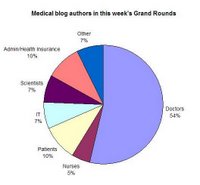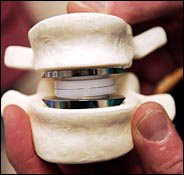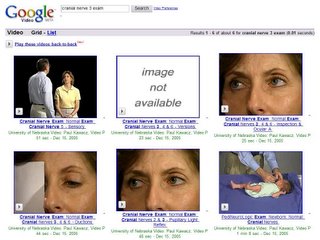What is this?Grand Rounds is a weekly summary of the best posts in the medical blogosphere.
Pre-Rounds is an article series about the hosts of Grand Rounds on Medscape.com. Nick Genes of Blogborygmi, who writes the Medscape column, is the founder of Grand Rounds and he maintains the
archive. If you would like to know more about the author of
Clinical Cases and Images - Blog, see the
Pre-Rounds interview here.
This week's Grand RoundsI work in a large tertiary care center which is probably one of the biggest and busiest hospitals in the world. There are doctors from all sorts of subspecialties, nurses, supportive personnel and, of course, thousands of patients who make this whole endeavor worthwhile.
This organization is glued together by the continuous effort of all these thousands of people (30,000) who come to work and make a difference in somebody's life because it is part of what they do everyday.

The medical blog community reminds me of the hospital structure. It is very interesting to see that the medical blogosphere has spread well beyond the limits of doctors and nurses as authors (click on the diagram to see this week's authors according to job/topic description). Grand Rounds is a snapshot of the best posts and shows the wide variety of medical blogs. It takes all of us to make the miracle of healing happen everyday.
DOCTORSHow to treat hyperkalemia (high potassium)? The new 2005 CPR Guidelines are reviewed by a nephrologistTreatments for hyperkalemia vary widely and and given the lack of standardization, it is not surprising that different doctors treat hyperkalemia in different ways. The new 2005 CPR guidelines from the American Heart Association provide recommendations for the treatment of hyperkalemia.
KidneyNotes offers some criticisms to make a better use of the guidelines in the real world. KidneyNotes.com is a blog maintained by a nephrologist (a kidney doctor).
Should we do PSA screening? A urologist's opinionDr. Savatta of
Robotic Surgery Blog reviews the pros and cons of PSA testing for prostate cancer. He critiques both the official guidelines and fellow bloggers.
Clinical judgment is the essence of medicineDB’s Medical Rants writes that clinical judgment remains (and will remain) difficult to define and therefore even more difficult to measure. He discusses three clinical cases as examples.
The “Can-do” spirit of the American health systemNo doubt the "can-do" attitude sometimes saves lives, helping some patients with impossible odds survive. Unfortunately, while such an attitude may work well for movie heroes, it does not always lead to victory in patient care.
Ad Libitum blog discusses the pros and cons of “do something, don’t just stand there” versus “masterful inaction.” (part
one and
two)
On Ariel Sharon’s cerebral hemorrhageMedical blogs follow the news of the day and often provide an explanation to the general public when a famous person is affected by an illness. Recently, Kevin, M.D. reviewed Tedy Bruschi's stroke and the President and the Vice-Presidents annual physicals exams. This week
DB’s Medical Rants discusses the two strokes that the Israeli prime minister had - ischemic 2 weeks ago and hemorrhagic later. The first stroke was embolic and similar to the one that affected Tedy Bruschi
. The second stroke was probably due to anticoagulation given to prevent the recurrence of the first. Dr. Bob (DB) writes that we must always remember that our treatments have both risks and benefits.
Shrinkette reminds us that only about 17% of strokes are hemorrhagic but they account for 30% of stroke deaths.
Sharon had three brain surgeries to evacuate blood in less than 24 hours although there is no sufficient evidence that this approach is clearly beneficial.
Medviews comments that taking care of politicians (and kings) is not easy. Frequently, because of their importance and prominence, they may paradoxically get poor care. Bioethics Discussion Blog also asks "Does Standards of Medical Practice Change for a King?" (part
one and
two).
We do not know all the details of Ariel Sharon's case and the above comments are just an expression of concern rather than a statement of fact.
Suicide bombers' damage lasts beyond the blastDoc Around the Clock links to a
BBC article about a suicide bomber with hepatitis who blew himself up and his body particles infected a survivor of the blast. "As a result of that case, all survivors of these attacks in Israel are now vaccinated for hepatitis B." (
BBC)
Sago mine tragedy due to carbon monoxide poisoningMiners' notes reveal their final moments: "It wasn't bad. I just went to sleep." The miners chose not to tell of their headaches, nausea, and dizziness, which are symptoms of carbon monoxide poisoning, as reported by
Shrinkette.
The answer to the question "Why are you overweight?”NHS Blog Doctor says that "the correct answer, the one that scores points, is straightforward: “Because I eat too much doctor.” We can work on that. The incorrect answer is “I don’t know, doctor, I don’t eat a thing.” Well, I am not sure about the situation on this side of the pond though. Just recently, a U.S. doctor was sued for telling a patient that she was too fat (
KevinMD has a summary of the the blogosphere responses).
Minute Clinic opening up at a CVS Pharmacy near youBruce of
Carolina Healthcare blog is worried that the new
Minute Clinic is not only down the street from their office but it also competes directly with their urgent care: "This will impact our business! How should we respond?" "You're Sick. We're Quick" is the Minute Clinic's trademark motto, their discount health care locations are staffed only by nurse practitioners. RangelMD has more on this
MiniDoc-in-Box concept which The Health Care Blog calls the
Walmartization of health care.
ER InterruptionsGruntDoc shares his frustration with one of the most annoying things in the ER: interruptions while speaking to patients. "I don't expect anyone to wait through the Gettysburg address, but there are natural pauses in conversations when questions aren't completely disruptive, can we all try to wait for that?" Apparently, studies show that the average ER doctor gets interrupted 20 times an hour. Comments say it best: "Nice rant."
Selective abortion of 10 million female babies in AsiaPickledPolitics blog comments on a
Lancet study which estimates that 500,000 female fetuses are aborted every year in parts of India, for no other reason than their gender.
Screening during the first trimester of pregnancyThe ObGyn doctor who runs the
Red State Moron blog sorts out some inaccuracies in the lay press about the prenatal screening. For starters, first trimester screening (combination of nuchal translucency and serum) is a
screening test, not a diagnostic test.
The Hidden Lives of Doctors: Weekend RoundsDespite the entreaties of some anxious patients, in most cases their doctor is not available 365 days a year. Some other doctor (often unknown to the patient) has to "cover" the weekend for their regular physician.
The Cheerful Oncologist has a three part commentary on The Hidden Lives of Doctors, this week's post reveals the mystery of weekend rounds in the hospital. Check out
part one (The Art of Signing Out) and
part two (The Tergiversator).
Fun with Medical StudentsMaria of
Intueri teaches medical students how to empathize with pshychotic patients. And she is pretty successful as you will see.
Do antidepressants increase suicide risk or not?TreatmentOnline blog asks if the FDA warning about antidepressants was wrong.
Don’t be Shocked - Poor Outcomes for Inpatient Cardiac ArrestsLubbDub (a cardiology blog, what else) writes about what we can do to
improve the dismal survival after a dreaded "code blue" in the hospital: "Codes have always amazed me in hospitals. As an intern, I felt the intense fear and sinking feeling of having to “perform” using what little knowledge I had to save a patient. I often saw interns running in the opposite direction rather than taking ownership of a dying patient. I quickly realized that the doctors role in a code was to be a calming force in an often chaotic situation."
Medical Consulting for Surgical PatientsThe Internal Medicine Doctor writes about
Medical Consulting requested by surgical services. The Doctor (formerly: Mad House Madman) has moved to a new domain (
internalmedicinedoctor.blogspot.com), so please update your bookmarks and RSS reader. So, now the Madman is a regular internal medicine doctor? Nothings is lost: WebMD just launched a blog called
Mad About Medicine.
How to dictate a radiology report?Hint: use less "cannot be excluded" and "clinical correlation recommended."
Sumer's Radiology Site links to the UCSF Radiology Department
guidelines on dictating CXR, CT, and other reports.
Somebody sign the death certificate, already!Respectful Insolence shares a personal story about his uncle who died of a heart attack but the death certificate was not signed for almost 3 days: "The lesson of this incident is that little things we doctors do, without even thinking about it, can, without our knowing it or necessarily appreciating it, cause enormous distress in patients or their families."
NURSESWhen A Patient Gets A "Two-For-One" DealEmergiblog describes what we sometimes call "an interesting patient." You never, ever want to be an interesting patient. Happily, for this particular gentleman, the outcome was good.
Final Year NervesA 3rd year nursing student (Unimum209, whatever that name means) shares her anxiety about starting her first job: "Two semesters of hard work and I will actually be a RN... Is it normal for panic to set in after 3 years of hard work??... I really enjoy reading other nurses, graduates and students blogs' as it is inspiring and comforting to know I am not alone."
There is a community of nursing blogs on
mediblogopathy.blogspot.com.
PATIENTSAppendectomy in JapanCrozierVision "puts himself at the mercy of the health services" in Japan and explains what it is to have an
appendectomy in Tokyo.
A diabetic's take on some timely newsAmy of
DiabetesMine comments on news, including the story that the CEO of Amylin Pharmaceuticals, Inc. (formerly of Eli Lilly) pricks her finger daily for a blood glucose test. The CEO is not a diabetic but she wants to know how the patients who buy their products feel every day.
Oculir's glucose readings from the whites of the eyes may soon put an end to finger testing.
Did you know you can call?Joan of
Oasis of Sanity is a patient who gives advice who to call when you do not have health insurance but you do need medical advice.
Talking to a friend about his depressionHealthy Concerns blog writes about a friend's relapse into depression and alcohol abuse: "Talking to even a close friend about their alcohol consumption is a sensitive thing..." She did not how to say it. May be the psychiatrists bloggers will have a suggestion.
Medicare Part D - Killing two birds with one stoneAARP claims that the new Medicare Part D Drug Benefit will be cheaper than reimporting drugs from Canada but
Healthy Policy blog has doubts.
INFORMATION TECHNOLOGYVirtual Patient Care Via InternetNurses check on patients via Internet, reports the Healthcare IT guy. He is worried if the health IT will be able to correctly track all that information submitted by devices in patient homes. Well, that is why we have a
medical connectologist blog.
eHealth blog writes that patients with minor ailments, like cold, get virtual
eVisits at Palo Alto Medical Foundation.
The First Medical Blog Network Was BornSome of you may be aware of the blogging networks like
Weblogs, Inc. (bought by AOL for $ 30 million last month) and
Gawker Media. Until recently medical blogs had just a RSS aggregator -
Medlogs.com (a great aggregator by the way) but not a network. This has changed now.
HealthVoice.com started the first medical blog network last week. They have 5 topical blogs in the
Featured Columns section, and anyone can start a free blog on their site.
Subscribe to
Medlogs RSS feed to get the updates from all medical blogs compiled into one feed.
SCIENTISTSMRSA kills 90,000 Americans a yearRuminating Dude lists a few things we can do the limit the spread of the deadly Methicillin-Resistant Staphylococus Aureus (MRSA).
Two potential rotavirus vaccines testedRotavirus-related diarrhea causes 70,000 hospitalizations per year in the U.S. The first vaccine against the virus called RotaShield was withdrawn from the market due to reports of an intestinal blockage (intussusception) associated with its use.
Aetiology blog informs us about two new vaccines that may be able to take RotaShield’s place.
Individual Response to COX-2 Inhibitors Affected by GenesGenetics and Health blog writes that genes may explain as much as 30 percent of the variation in individual responses to COX-2 pain killers. People have different adverse effects and to a different extent (for example, blood pressure increase) according to their genetic makeup. Pharmacogenomics is the science of investigating the genetic variations in response to medications.
HEALTH INSURANCE and ADMINISTRATIONHospital WarsThe nation's hospitals posted record profit margins this year but yet some for-profit hospitals are closing. "Efficiency is doing something right and effectiveness is doing the right thing. Sort of hard to sort them out sometime", writes
Fixin' Healthcare.
2006 Forecast for Hospitals: The year of Consumer-Driven HealthcareHospital Impact blog lists a few predictions for 2006: patient volume will drop and become more erratic, more phone calls from hospital comparison shoppers, blurring between banks and health plans will continue, just to name a few.
Health Spending In Different CountriesEzraKlein argues that Americans pay more for health insurance and receive less than residents of other countries: "The fiction that we pay more but receive proportionately greater amounts of care is just that: a fiction."
Another Ethical QuestionInsureBlog asks if we should pay for an operation for an Americal citizen who is about to permanently leave the country. Check his comments section.
LITERARY and OTHER BLOG POSTS (interesting posts not classified in the groups above)Baby Boy"For in that moment I saw my own birth and my own death, lived hundreds of years spanned by the lifetimes of my kin who came before me, and relinquished my bittersweet hope of being forever young." Who else but
Dr. Charles?
What's a Rich Doctor To Do?A medical student in Iran is asking this provocative question. Check out the answer on
The Differential blog and if you do not agree, write your opinion in the comments section. Getting instant feedback right there on the web page is part of what makes blogging such a rewarding experience.
After years of shift ER workDr. Tony tells us a story which blends past, present and future and ends in a dream.
What I've Learned By Reading BlogsRita of
MSSP Nexus Blog thinks that reading (and writing) medical blogs is an eye-opening experience. I could not agree more.
Check out Grand Rounds next weekThe host of next week's Grand Rounds is
GruntDoc, an ER physician in Texas. His blog was voted the Best Medical Weblog of 2004. The
voting for 2005 Medical Weblog Awards is open now.




 The Arizona Heart Institute cardiovascular surgeon Grayson Wheatley uses video iPods to educate his patients. Before discharging patients from the hospital, he gives them iPods loaded with videos about diet, exercise and other information about their heart surgery.
The Arizona Heart Institute cardiovascular surgeon Grayson Wheatley uses video iPods to educate his patients. Before discharging patients from the hospital, he gives them iPods loaded with videos about diet, exercise and other information about their heart surgery. 45 yo with severe degenerative disc disease (DDD) of the lumbar spine continues to complain of back pain. Physical therapy, NSAIDs and opioids relieve the pain only temporary. He has had lower back pain (LBP) for 9 months.
45 yo with severe degenerative disc disease (DDD) of the lumbar spine continues to complain of back pain. Physical therapy, NSAIDs and opioids relieve the pain only temporary. He has had lower back pain (LBP) for 9 months. Google Tutorials
Google Tutorials Feed2Podcast automatically converts blog text to audio via Text-to-Speech. It turns the last 7 items from your RSS feed into a podcast.
Feed2Podcast automatically converts blog text to audio via Text-to-Speech. It turns the last 7 items from your RSS feed into a podcast. Johns Hopkins Medicine has a health podcast which is described as "a lively discussion of the week'’s medical news and how it may affect you."
Johns Hopkins Medicine has a health podcast which is described as "a lively discussion of the week'’s medical news and how it may affect you."
 Medical blogs often complement journal articles. Even the popular medical portal Medscape prominently features the best of the medical blogosphere on its front page.
Medical blogs often complement journal articles. Even the popular medical portal Medscape prominently features the best of the medical blogosphere on its front page. Are medical records still in dark ages?
Are medical records still in dark ages? Notes from Dr. RW has compiled a list of the Top 10 Issues in Hospital Medicine in 2005:
Notes from Dr. RW has compiled a list of the Top 10 Issues in Hospital Medicine in 2005:

 The Cleveland Clinic distributes medical news videos that can be downloaded to a video iPod. You can subscribe to the regular RSS feed to watch the videos on your computer or you can download them directly to an iPod via iTunes. The service is called Health Edge. Videos are available on Google Video, just search for "Cleveland Clinic".
The Cleveland Clinic distributes medical news videos that can be downloaded to a video iPod. You can subscribe to the regular RSS feed to watch the videos on your computer or you can download them directly to an iPod via iTunes. The service is called Health Edge. Videos are available on Google Video, just search for "Cleveland Clinic".

 Epocrates made its name as an easy to use free pharmacopoeia for Palm and Pocket PC. Now Epocrates offers the same features online:
Epocrates made its name as an easy to use free pharmacopoeia for Palm and Pocket PC. Now Epocrates offers the same features online: A red squirrel on Flickr.
A red squirrel on Flickr.